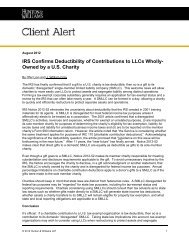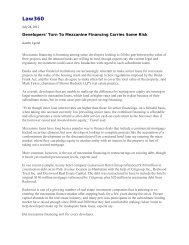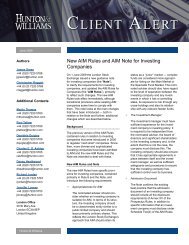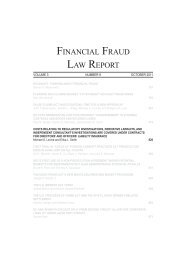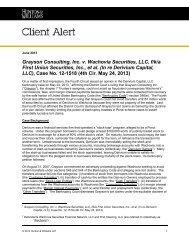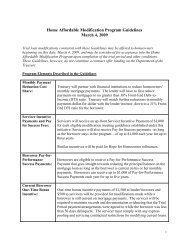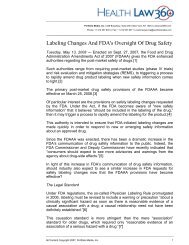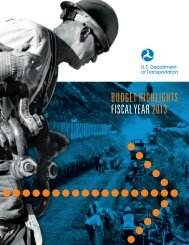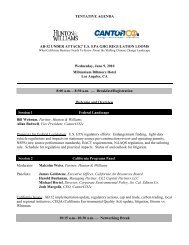Hunton & Williams Renewable Energy Quarterly, September 2009
Hunton & Williams Renewable Energy Quarterly, September 2009
Hunton & Williams Renewable Energy Quarterly, September 2009
Create successful ePaper yourself
Turn your PDF publications into a flip-book with our unique Google optimized e-Paper software.
<strong>Renewable</strong> <strong>Energy</strong> <strong>Quarterly</strong><br />
private funds are already subject to the antifraud rules of<br />
the Advisers Act, if they are required to register as investment<br />
advisers, they will become subject to all provisions of<br />
the Advisers Act, including its rules relating to client asset<br />
custody, recordkeeping, advisory contracts, limitations on<br />
performance fees, ethics and personal trading policies,<br />
investment and financial reporting, and advertising.<br />
In addition to the regulation of fund managers under the<br />
Advisers Act, another recent proposal would subject private<br />
investment funds to additional regulation as “investment<br />
companies” under the Investment Company Act of 1940<br />
(the “Investment Company Act”). Also under this proposal,<br />
“large investment companies” (those with assets under<br />
management of $50 million or more) would be required to<br />
register with the SEC under the Investment Company Act<br />
and comply with other disclosure, reporting and examination<br />
requirements.<br />
Another proposal, the “Corporate and Financial Institution<br />
Compensation Fairness Act of <strong>2009</strong>” (H.R. 3269), which was<br />
passed by the House of Representatives on July 31, <strong>2009</strong>,<br />
includes a requirement that the SEC and other federal regulators<br />
adopt rules requiring investment advisers and other<br />
covered financial institutions with assets of at least $1 billion<br />
to disclose incentive-based compensation arrangements and<br />
prohibiting certain incentive-based payment arrangements.<br />
As of this writing, there is little information regarding the<br />
disclosure rules and types of incentive-based compensation<br />
practices that would be prohibited by investment advisers,<br />
such as fund sponsors. The Senate has not approved<br />
comparable legislation and the prospects for the bill being<br />
enacted into law are uncertain as of this writing.<br />
In addition, the SEC has proposed for comment rules placing<br />
restrictions on political contributions and the use of placement<br />
agents in connection with soliciting investments from<br />
governmental plans. These restrictions may make it harder<br />
for first-time fundraisers, but would only impact marketing<br />
to public pensions. For the reasons discussed below, these<br />
public pensions may be less likely candidates for investment<br />
in Project Funds.<br />
Changing Tax Rates<br />
Once again, Congress is attempting to increase taxes on<br />
the lucrative incentive compensation that private equity fund<br />
managers receive from the funds they manage. Currently,<br />
the character of income received from a partnership such as<br />
a private equity fund is determined at the partnership level,<br />
so that partners report ordinary income, capital gain and/or<br />
qualified dividend income depending on the character of the<br />
income received by the partnership. Thus, if the partnership<br />
recognizes long-term capital gains and qualified dividends,<br />
the individual partners would be subject to tax on that<br />
income at capital gains rates. Recently, the U.S. Treasury<br />
Department (“Treasury”) proposed to tax income and gain<br />
from a partnership profits interest received in exchange for<br />
services (known as “carried interest”) as ordinary income<br />
regardless of the character at the partnership level, unless<br />
the income or gain was attributable to the partner’s “invested<br />
capital.” The income from a carried interest would also be<br />
subject to self-employment taxes. The carried interest proposal<br />
would apply to all partnerships and would be effective<br />
for taxable years beginning after December 31, 2010. In<br />
addition, the proposal would eliminate the current 33 percent<br />
and 35 percent tax brackets and would add tax rate<br />
brackets of 36 percent and 39.6 percent for individuals with<br />
income over $250,000 (or $200,000 for single taxpayers).<br />
The proposal would increase the tax rate on capital gains<br />
and dividends to 20 percent for individuals with income over<br />
$250,000 (or $200,000 for single taxpayers), effective for<br />
taxable years beginning after December 31, 2010. Due to<br />
the number of recent proposals to modify the tax treatment<br />
of carried interest and the lack of any apparent significant<br />
political opposition to such a proposal, it seems likely that<br />
some form of the current proposals to tax carried interest at<br />
ordinary income rates will be approved in the near future.<br />
Potential Investors<br />
Sponsors considering investment of existing funds in renewable<br />
energy projects, and those raising new Project Funds,<br />
should focus on whether their current or anticipated investor<br />
base can benefit from relevant government programs, the<br />
incentives from which often make the difference between<br />
viable and nonviable projects. Project Funds and renewable<br />
project investments were traditionally sought mostly<br />
by tax equity investors. The Project Fund could allocate<br />
the federal tax credits and accelerated depreciation to the<br />
taxable investors seeking an after-tax return. However, in<br />
mid to late 2008, the traditional tax equity investors found<br />
themselves without a tax reduction appetite and equity<br />
investment in these projects stalled. The Obama administration<br />
and Congress offered some help in the form of the<br />
ARRA. The ARRA permits taxpayers to claim cash grants in<br />
lieu of production or investment tax credits for certain types<br />
of renewable energy facilities, such as wind, closed-loop<br />
biomass, open-loop biomass, geothermal, solar, landfill gas,<br />
27 <strong>Renewable</strong> <strong>Energy</strong> <strong>Quarterly</strong> www.hunton.com





